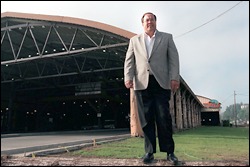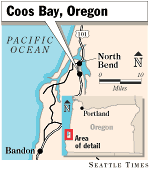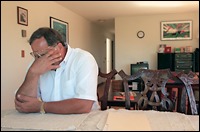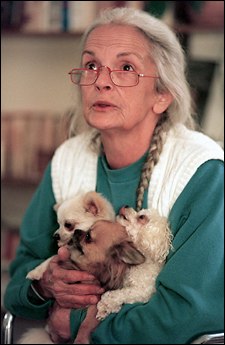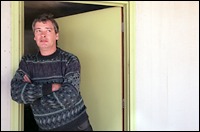 |
 |
 |
| Your account | Today's news index | Weather | Traffic | Movies | Restaurants | Today's events | ||||||||
|
December 2, 1996
Key to HUD's cashbox
After retiring from the National Football League, Bruce Anderson had been a stockbroker, factory owner, magazine publisher and co-owner of a professional soccer team. At age 48, he was a millionaire who believed the aggression he had honed on the football field was the key to success in the business world. In 1992, he brought that ferocity to the small coastal Oregon Indian tribe to which his grandmother had belonged. "My goal," he said, "was to see one tribe in the country succeed."
Who could argue? Certainly not the Coquille Tribe, which
allowed Anderson — one-eighth Coquille — to place himself at the
helm of its economic future.
Not coincidentally, those are the same four years in which the Department of Housing and Urban Development dramatically eased its regulation of the federal program that provides housing for poor Native Americans. That policy change has left the program ripe for exploitation by operators who recognize that tribal status is essentially a key to HUD's cashbox. Across the country, such consultants and entrepreneurs — some of them Indians, some non-Indians, and some, like Anderson, born-again Indians — have found ways to tap into the half-billion-dollar-a-year stream of HUD's Indian-housing program to help themselves and their friends at the expense of the neediest on Indian reservations. Meanwhile, more than 100,000 Native Americans live in crowded, unsanitary, primitive conditions most Americans would consider intolerable.
Records and interviews indicate Anderson exaggerated the
Coquilles' need for federal assistance, snatching up a third of the
money available in Oregon, Washington and Idaho in 1994 and
depriving other, poorer tribes.
He did build HUD-subsidized houses, but some of those were originally designated for people making too much money to qualify for the program. And one would have gone to Anderson himself except that a HUD official convinced him it wouldn't look good to others in the tribe. All this could have been stopped by HUD at least a year before it was. Jerry Leslie, administrator for HUD's Indian programs in the Northwest, acknowledges he received tips that should have spurred an investigation of Anderson and the housing authority. But Leslie ignored the warning, obeying instead a 1992 directive from HUD headquarters that said tribal leaders should be given wide leeway in spending federal money. It wasn't until February of this year that the HUD inspector general finally began investigating Anderson's activities, and the Department of Justice has since joined the probe. Independent auditors describe the Coquille operation as completely out of control. Looking back, Leslie sheepishly shakes his head at the way he and other HUD officials were bowled over by the cocky, high-energy businessman who seemed to know so much about finance. "He was very, very good." Good, and intimidating. "You've got 300 pounds of very angry football player banging his hands on the desk saying, 'I'll be glad to roll your head down the hall like a bowling ball,' " said Dan Milburn, former director of the Coquille housing authority, describing his ex-boss.
Anderson admits: "I'm tough and nasty. I am." He quickly adds:
"I am very fair."
Growing up in Coos Bay, then a gritty sawmill town on the Oregon coast, Bruce Anderson's Native-American heritage was deep in the background. His mother's mother was a Coquille tribal princess, but most of his ancestors — like most of his classmates — were of European stock. Young Anderson's attention was focused not on his past but on his destiny: to be a football star. He was big enough and good enough, after playing at Marshfield High School and tiny Willamette University, to be drafted in 1966 by the Los Angeles Rams. Traded to the New York Giants, he was an NFL player of the week in October 1970 before ending his playing years in 1971 with, of all teams, the Washington Redskins. A fan on Wall Street got Anderson started as a stockbroker. He rose to vice president of the brokerage firm before leaving the business in 1980 to found the magazine Inside Sport. Three years later, Anderson climbed further back into the sports world by buying a portion of the Seattle Sounders professional-soccer team. Life on the sidelines was much different than on the playing field, he found. He feuded with co-owners and fans. A Seattle Times columnist wrote that Anderson was a "menace" who had turned the team's front office into a "mutinous mess." After losing more than $1 million, Anderson unloaded the Sounders for a dollar to a previous owner. In 1990, he separated from his wife of 25 years and they divided up more than $3 million.
He found himself at a crossroads. After an unsatisfying trial
retirement on Whidbey Island, he turned homeward, to the Coquille
Tribe.
The Coquilles, officially disbanded in 1954, were reinstated by Congress to full-fledged tribal status in 1989. The government gave the 550 enrollees access to a wide range of federal grants, 1,000 acres of land, and the profits from a casino. Not much happened in the first couple of years of recognition, before Anderson got involved. He recalls tribal members begging for his help; they remember him aggressively volunteering, promising he would create jobs if they left things to him. In 1992, working out of an office in Lynnwood, Wash., 400 miles from Coos Bay, Anderson formed the Coquille Economic Development Corp. (CEDCO) to run tribal businesses. He named himself president and his son, Troy, vice president. Anderson then obtained HUD approval to create the Coquille Indian Housing Authority, set up as an arm of CEDCO. HUD regulators didn't object to the arrangement, though housing authorities usually report directly to a tribal council and not to a company with a separate board of directors that includes outsiders.
And normally, tribal leaders handpick the boards that run
housing authorities. This time, Anderson did the picking, with the
tribe rubber-stamping his choices.
So it was that Anderson himself was appointed to the board as chairman, with his son, his nephew and two of his friends as directors. CEDCO employees included Anderson's fiancee and eventual second wife, Patricia Jones, and his best friend from boyhood, businessman Carl Nelson. Neither is Native American. "You need people you can trust," Anderson explained. "Loyalty comes first." Tribal members were certainly loyal to him, at least at the start. The tribe and the greater Coos Bay community were wowed by Anderson; even the managing editor of the local newspaper quit his job to work for him. "Everyone put their trust into this guy," said tribal chairman Ed Metcalf. "They gave him the ball and let him run with it." Number 'phony as hell' Run with it he did. Anderson hired a grant writer to guide him through federal regulations. They worked 16-hour days applying for government money, driven by what one friend described as Anderson's "heart that beats like a gerbil's." The tribe got $5.5 million from the Bureau of Indian Affairs to build an assisted-living facility for the elderly. Then, in 1994, the Coquilles won two separate HUD grants totaling $7.8 million to build 80 houses. Coni Wilson, vice chairwoman of the Northwest Indian Housing Association, said she and other Indian leaders were furious that a brand-new housing authority got more than a third of the HUD money available for the region that year when other tribes had greater needs. Anderson's bid knocked off 24 projects submitted by 19 other tribal-housing authorities. In Washington state, those included the Makah, Swinomish, Yakama, Lower Elwha, Shoalwater Bay, Port Gamble, Lummi, Tulalip, Suquamish, Skokomish and Nisqually tribes. A 1994 HUD regulation gave preference to newly created housing authorities. However, Leslie, the HUD administrator in Seattle, took it a step further and assumed — incorrectly — that he had to give Anderson every dime he asked for. To be sure, Anderson's grant application was impressive _ although it was based on some suspect information. The application said 111 tribal families qualified for HUD-subsidized housing, meaning they had household incomes of $21,200 or less for a family of two or $26,500 or less for a family of four. Dan Milburn, who went to work for the authority in February 1995 and became director in August of that year, says the number Anderson submitted was "phony as hell." Among the 111, Milburn said, were people living in other states, some with six-figure incomes, "doctors, people with construction companies, people with independent businesses in Hawaii." HUD regulations allow Indian-housing authorities to give five subsidized homes to tribal members whose incomes exceed the guidelines, but only if they cannot "reasonably" find housing elsewhere. Leslie said the practice at HUD was to ignore that restriction. That's all the opening Anderson needed. He made a motion to his housing-authority board in July 1995 to reserve houses for four people whose incomes were well over the limit: Anderson (with assets over $1 million and earnings well over $60,000 a year), tribal chief Ken Tanner ($75,600 a year), tribal chairman Metcalf ($50,400 a year) and tribal-enrollment coordinator Sharon Parrish ($46,800 a year). Anderson told the board these people would each get a $60,000 subsidy from taxpayers, pay only $176 a month for their new houses and pay no property taxes. Anderson was in line to get for $20,000 a house that cost $81,000 to build. The board approved the deal. HUD likely never would have questioned it, but Leslie said he persuaded Anderson to take himself off the list when some tribal members complained. "I just told him I thought it wasn't a good idea," Leslie said. "I couldn't have forced him off." Tribal-council member Sheldon Chase, who makes $43,800 a year, was added to the list in Anderson's place in December. Milburn said the new houses were Anderson's way of keeping other powerful tribal members under his influence. Anderson said he wanted the new housing project to have a mixture of higher- and lower-income people. Asked whether he really deserved a HUD-subsidized house himself, Anderson replied: "I probably did, because I did all the work." 'Nobody questioned it' Although he didn't get a HUD house, Anderson bought himself a Cadillac with CEDCO money, and doubled his salary to $120,000 a year, according to tribal officials. He added clauses to lease agreements that required the tribe to pay him $500,000 and his pal Nelson $100,000 if they were ever fired. And he began playing even faster and looser with the rules, according to former employees. One, who requested anonymity for fear of retribution, said HUD money, labor and equipment were used for work that wasn't part of the housing project — including work on Anderson's personal property. CEDCO's other endeavors, a retirement home and the casino, were losing money or not making what was expected. A group that included former Chrysler chairman Lee Iacocca promised the tribe $16.7 million for casino development, and then cut back. There was no other source of cash. The former staff member said she believes Anderson intended to replace the HUD money used for other purposes, but that in some cases "things never got put back." "Nobody questioned it. Nobody checked it. Bruce was always right," said the woman, who worked closely with Anderson for two years. "I don't think, in a lot of ways, Bruce thought he was wrong." She blames HUD for not watching Anderson more closely. "He got used to it in the beginning, doing this and not getting caught," she said. "And I just think it became easier for him." Not that HUD didn't have fair warning. The first alarm came in 1993 from Poo-sa-key, a diminutive Northern Plains Indian who keeps a fax machine busy in her tiny home in Bandon, 30 miles down the coast from Coos Bay. Using informants, she peppered HUD officials with inside information from the Coquilles, "yelling right from Day One and writing everybody under the sun: 'Watch the money, watch the money.' " When Anderson found out, "Bruce would make screaming phone calls at me from his Lexus, on cellular phones," she said. Leslie, the Northwest HUD administrator, said Poo-sa-key seemed to be a pest, but he now realizes he should have paid more attention to her. And, he admits, he should have heeded the next tipster: Seattle-based housing consultant Craig Dougall. In late 1994, Anderson was talking with Dougall about possibly managing the Coquille housing project. While negotiating, Dougall said, Anderson asked him "to clean up some things for them." Those "things" appeared to Dougall to be rule violations and misspent HUD money. Dougall didn't get the Coquille contract. But in a water-cooler conversation in HUD's Seattle office in January 1995, he told Leslie and other officials about what he'd heard from Anderson. Dougall recalls telling them "to send a team down there to start repairing this before it gets out of hand and people start going to jail." "HUD's response," Dougall said, "was they had no authority to do that." Leslie recalls the conversation. He thinks he passed the information verbally to the office of the inspector general, the branch of HUD responsible for investigating such allegations. Officials there, though, say they never received the tip. Dougall himself is now under federal investigation for his work advising other tribal-housing authorities. 'Dial-for-dollars' program In late 1994, Anderson decided to go into the construction business. Rather than hiring an outside contractor to build the HUD-subsidized houses on the Coquille reservation, he would do it himself. All he needed was HUD's permission to start construction and to withdraw the grant money from the federal treasury. In October 1994, HUD had initiated a "dial for dollars" program that allowed housing authorities with approved grants to phone a computer, punch in a code number, and withdraw money. There was no scrutiny unless an agency overdrew its account. Anderson got his account in December. Seeking final approval to withdraw money for the start of construction, in March 1995 he ordered staff members to work overtime, reminding them Congress was preparing to rescind grants for housing authorities that had not started construction. When the application papers were ready in April, he chartered a private plane at taxpayer expense and hand-delivered the papers to Leslie in Seattle and to the Bureau of Indian Affairs in Portland. In three days — a HUD record — Anderson got his notice to proceed with construction and permission to withdraw more money. At the beginning, he took out $137,000 a month. He then increased the withdrawals to an average of $500,000 a month over a five-month period in 1995, "with no change in construction activities," according to a recent HUD report. Auditors are still trying to trace where all the money went. An intimidating style In August 1995, Anderson was confronted about his activities at a tribal meeting by a young tribe member who had worked for him. Tribal leaders invited HUD representatives in to check things out, and they began to discover irregularities. Three months later, two tribal-council members made an end run around Anderson to tell HUD officials in Seattle that he was violating the rules. Housing-authority employees also telephoned HUD, in the face of threats from Anderson. Milburn, the former housing-authority director, said Anderson warned him more than once about letting HUD know what was going on. "And he said, 'That includes getting your head ripped off your shoulders,' " Milburn recalled. Others confirmed Anderson's intimidating tactics. Architect Karen Croyle, who worked in the CEDCO office, said he once "grabbed me by the collar and jerked me" and that his "uncontrollable anger" was a constant threat. Anderson says he was a high-powered businessman unaccustomed to the world of government regulations. He says his employees had assured him that everything the housing authority was doing was legal. "We didn't want to do it the Indian way," he said. "We wanted to do it the Wall Street way." In the second half of 1995, two HUD representatives in Coos Bay on routine business met with housing-authority employees about their concerns. When the two began to look more closely at Anderson's activities, they found much of what the employees had complained about, and more. Their findings were later supported by a draft audit. HUD documents indicate: In February 1995, Anderson's wife bought Coos Bay property for him, in her name, for $50,000. Five months later, at Anderson's request and using HUD money, the housing authority bought the property from Anderson's wife for $75,000. CEDCO obtained free surplus construction equipment from the federal General Services Administration, and then leased it to the housing authority for nearly $300,000. The money came from the HUD grant. At Anderson's urging, the housing authority purchased a Washington-based company that produced wall and floor panels and moved it to Coos Bay. Anderson spent $100,000 in HUD money to relocate the factory, then told CEDCO board members he wanted to buy it personally. Also at Anderson's urging, the housing authority used more than $260,000 in HUD money to build an unauthorized clinic and to develop a cranberry bog in the middle of the housing project. Anderson ordered a staff member to alter vouchers so that they could be paid with HUD money, the staff member said. HUD investigators are now questioning one voucher for nearly $20,000 paid to Seattle attorney Scott Crowell. Most of the work Crowell did was for the casino, though Crowell says some of his research would have indirectly benefited the housing project. On Anderson's orders, two companies that were owed more than $100,000 each for electrical and plumbing work on the casino were paid $60,000 for extra contracts at the housing site. Investigators are looking into whether HUD money was used to appease casino creditors. HUD probably would have detected problems at the housing authority early on had the organization been properly audited. The law requires an annual audit of any agency receiving federal money, but that didn't happen here: In 1994, the local auditor hired by the Coquilles looked at the wrong set of books, and in 1995 he was turned away three times by CEDCO's accountant before he finally got in, only to discover that documents essential to any audit were missing. Ron Sells, an Everett fraud examiner who specializes in tribal finances, said problems like this arise because "HUD doesn't take auditing seriously." Finally, this year, Sells and four other audit firms were hired by the tribe to examine CEDCO's books. What investigators found Even after employees blew the whistle, and even after the findings of the two HUD representatives, the department did not act for months. Leslie blamed Oregon's hard winter for the delay. Finally, in late February of this year, HUD Regional Inspector General George Tilley told Leslie to take immediate action to protect the taxpayers' money from Anderson. In March, the tribal council took over the housing authority from the board. In May, after Anderson kicked federal investigators out of his office, the tribe suspended him with pay — the first step toward his eventual firing in September. Employees had to prevent Anderson from removing records on his way out. Anderson sued the tribe, but a federal judge rejected the case. Anderson maintains his innocence and insists his actions were meant to help the Coquilles. He blamed the scandal on "sick and twisted lies." His lawyer, Steven Hart of Phoenix, also accused tribal members of misrepresenting Anderson's role. "Mr. Anderson was a man with a dream who set about trying to do something extraordinary for Native Americans," Hart said. Meanwhile, the first HUD house on the Coquille reservation was occupied in August. The total project has been pared from 80 to 72 houses, and that number will probably decrease further if the tribe cannot repay money that was diverted for other purposes. "We took a pretty big hit. We are trying to get well," said construction-project manager Jack Fearell. The investigations continue, and tribal leaders worry about the future.
Bruce Anderson has left a legacy with his grandmother's people,
though certainly not the one he intended: The Coquilles may have to
pay HUD as much as $1.7 million to cover the problems he left behind.
|
|
||||||||||||||||||||||||||||||||||||||||||||||||||||||||||||||||
seattletimes.com home
Home delivery
| Contact us
| Search archive
| Site map
| Low-graphic
NWclassifieds
| NWsource
| Advertising info
| The Seattle Times Company
